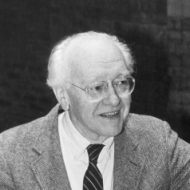The composer Karel Husa learned to play the violin and the piano in early childhood and, after passing his final examination at high school, he enrolled in the Prague Conservatoire in 1939 where he studied in a class of Jaroslav Ridky, a Czech composer with traditional leanings, and attended courses in conducting led by Metod Dolezil and Pavel Dedecek. He immersed himself in music, doing his best to absorb what at that time - during the years of wartime restrictions and isolation of the Protectorate - was going on in Prague's musical life. Karel Husa's first achievements as a composer date back to his studies. For example, his Sonatina for Piano Op. 1 was frequently performed, publicized and written about in the press. In actual fact, press comments referred to this composition as "a delighful work, remarkably fresh, magnificently written for the piano" and as a piece that "... places Karel Husa in the first rank among our young composers." Equally well received were Husa's other early works, and in January 1945, he scored great success while conducting the Prague Symphony Orchestra's performance of his own graduate composition at the Prague Conservatoire, Overture for Large Orchestra Op.3.
After the end of the Second World War Husa was admitted to the graduate school of the Prague Conservatoire, where he attended courses led by Jaroslav Ridky and graduated in 1947. At the same time, he decided to continue his studies of composition and conducting in Paris. Beginning in 1947 Arthur Honegger and Nadia Boulanger were Husa's composition teachers. He studied conducting with Jean Fournet, Eugene Bigot and Andre Cluytens. After finishing his courses in conducting at Ecole Normale de Musique de Paris and at Conservatoire de Musique de Paris, Karel Husa embarked on a career during which he conducted the world's leading orchestras and participated in many major projects. He divided his time between composing and conducting, taking an ever more active part in Parisian and international musical life.
In the post-war era Karel Husa's links with his native country deteriorated. Following the coup d'etat in Czechoslovakia in 1948, he did not return home, and his compositions virtually disappeared from Czech concert halls. A Czechoslovak musical dictionary published in 1963 carried an entry on Husa, characterizing him as an "advanced composer of great musicality and inventiveness". However in terms of public performances of his works, the last major event was the premiere of his First String Quartet on May 27, 1948 at the Prague Spring by a then renowned international music festival. This particular composition was performed by the Smetana Quartet, to which the piece was dedicated. His First Quartet marked a big step on the composer's path to the realm of international music: the Quartet received the 1950 Lili Boulanger Prize and the 1951 award at the music festival in Bilthoven in the Netherlands. It has since also been performed on many other occasions, e.g., at the festival of the International Society for Contemporary Music in Brussels (1950), festivals in Salzburg (1950), Darmstadt (1951), and the Netherlands (1952) as well as at various concerts in Germany, France, Sweden, England, Switzerland, Australia and the United States. The Czech press then had its first opportunity of commenting on this composition: "This String Quartet confirms that Karel Husa is one of the greatest hopes of Czech music", said Prague's Prace daily newspaper on May 30, 1948, while Prazske noviny (Prague News) described Husa on the same day as one of the most gifted young Czech composers. This was followed by a series of comments in the foreign press, starting with Arthur Honegger's remark in 1949: "... this String quartet is a work worthy of receiving the attention of the musical world."
One year later, in 1954, Karel Husa was offered a post in the Department of Music of Cornell University in Ithaca, New York, to lead the local orchestra and teach composition and musical theory. He decided to take up the offer, and in March, 1954, he and his wife and two daughters moved to the United States. In 1959 Karel Husa was granted US citizenship and has stayed at Cornell University until his retirement in 1992. In addition to his composing activities, teacher and conductor Karel Husa has frequently appeared as guest conductor throughout the United States, in many European countries and also in Asia. He was elected Associate Member of the Royal Belgian Academy of Arts and Sciences in 1974 and has received honorary degrees of Doctor of Music from several institutions, including Coe college, the Cleveland Institute of Music, Ithaca College, and Baldwin Wallace College. Among numerous honors, Husa has received a fellowship from the Guggenheim Foundation; awards form the American Academy of Arts and Letters, UNESCO, and the National Endowment for the Arts; Koussevitzky Foundation commissions; the Czech Academy for the Arts and Sciences Prize; the Czech Golden Medal of Merit, First Class, from President Vaclav Havel (1995); and the Lili Boulanger award. He also became a honorary doctor at several Czech universities, recording of his works have been issued on CBS Masterworks, Vox, Everest, Louisville, CRI, Orion, Grenadilla, and Phoenix Records, among others. He has been awarded the 1969 Pulitzer Prize for his Third String Quartet, and his Cello Concerto the 1993 Grawemeyer Award. On 13 February 1990, Husa realized a long-time dream when he conducted the orchestral version of Music for Prague 1968 in Prague.

